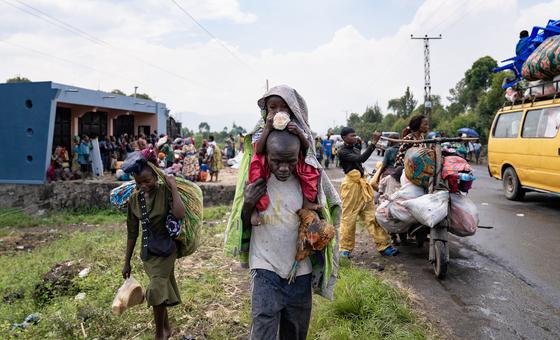
“We are deeply alarmed at the heightened risk of an attack by the M23 armed group on Goma, the capital of North Kivu, in the eastern Democratic Republic of Congo…Any such attack on Goma risks catastrophic impacts on hundreds of thousands of civilians, putting them at heightened exposure to human rights violations and abuses,” said Ravina Shamdasani, spokesperson for the UN human rights office, OHCHR.
“The High Commissioner has flagged many times that sexual violence is a key component – a very horrific component – of this conflict,” Ms. Shamdasani added. “Armed groups abduct, hold captive and subject women and girls to sexual slavery and many of them have been killed after being raped.”
Since the UN peacekeeping Mission, MONUSCO, withdrew from South Kivu in June 2024, peacekeepers have defended key positions in North Kivu, including Goma and Sake, where clashes between the M23, the Congolese Armed Forces and other armed groups have continued.
Hundreds of thousands newly displaced
Some 400,000 people have been displaced in North and South Kivu since the beginning of this year alone, according to the UN refugee agency, UNHCR.
Highlighting the humanitarian crisis that continues to unfold largely unseen by the outside world, UNHCR spokesperson Matt Saltmarsh reported that “bombs have fallen” on camps for people uprooted by the violence in South and North Kivu.
These attacks include one on 20 January, when explosions at Kitalaga site in South Kivu killed two children. On 21 January, five makeshift shelters were destroyed in Nzuolo, near Goma, while on Wednesday, Bushagara site – also near Goma – was “heavily impacted, causing panic and new waves of forced displacement”, Mr. Saltmarsh told journalists in Geneva.
He noted that heavy bombardments from clashes involving the M23 rebels forced families to flee various displacement sites on the periphery of Goma and try to seek safety within the city…UNHCR staff remain on the ground in Goma, assisting the displaced civilians wherever they can and wherever they get access,” he said. “But as you can understand, the access at the moment is extremely challenging.”
Guterres warning
The development came as the UN Secretary-General on Thursday expressed alarm over a renewed offensive by M23 rebels in eastern DRC and the “devastating toll” on civilians.
In a statement issued by his Spokesperson, António Guterres noted the Rwandan-backed rebels’ seizure of Sake, in South Kivu, “which increases the threat” to the regional capital Goma – all of which is “heightening the threat of a regional war”. Rwanda denies any direct involvement with M23 fighters.
“The Secretary-General calls on the M23 to immediately cease its offensive, withdraw from all occupied areas and abide by the 31 July 2024 ceasefire agreement,” the UN chief’s statement continued.
Echoing the Secretary-General’s concerns, OHCHR spokesperson Ms. Shamdasani reiterated UN chief Volker Türk’s appeal “to all States with influence on the parties to impress on them the urgent need for an immediate cessation of hostilities”. M23 is well funded and “as the High Commissioner has said previously, any role played by Rwanda in supporting the M23 in North Kivu – and by any other country supporting armed groups active in the DRC – must end,” she insisted. “The people in the DRC are exhausted by violence, exhausted by conflict, exhausted by the horrors of their daily life. And this must not be allowed to worsen further.”
Stark options
Asked to explain the dangers faced by those sheltering in camps, UNHCR’s Mr. Saltmarsh replied that their “options are stark and extremely limited…What you will receive in terms of aid is extremely limited – that depends very much on whether agencies like UNHCR and our partners in the UN and NGOs are able to access those sites. If they are, we can bring in a minimum of assistance, otherwise, civilians will be in areas that are now occupied by the armed groups. We don’t have access to those areas, so it’s very difficult to for us to say what conditions are like there.”
South and North Kivu Provinces already host 4.6 million internally displaced people. UNHCR has warned that human rights violations, including looting, injuries, murders, kidnappings and arbitrary arrests of displaced people mistaken for rebels have escalated.
“Hospitals are nearing capacity with injured civilians,” Mr. Saltmarsh said. “Vulnerable women, children, and the elderly are living in overcrowded and precarious conditions with limited access to food, water, and essential services.”
